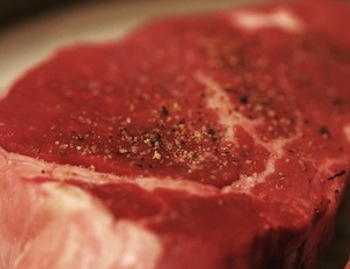Less Meat, More Health

16 Apr 12 |
It has been documented in various studies and reports that too much red and processed meat in our diet can significantly increase our risk of developing cancers of the bowel, oesophagus, lung, pancreas and endometrium.
A recent meta-analysis study carried out by researchers from the Karolinska Institute in Sweden (Larsenn et al, 2012) suggests that an increase of 50g of processed meat per day in the diet is significantly associated with a 19% increased risk of developing pancreatic cancer. The biological explanation for these results is that processed meats are typically preserved with nitrite, but may also contain N-nitroso compounds, which are known to be harmful to DNA in cells. Red meat alone can stimulate the production of N-nitroso in the stomach, which is then carried to the pancreas through the bloodstream, and increasing the risk of cancer at this site. Research has also found that heam compounds in red meat can damage the lining of the bowel (WCRF, 2007).
Recent research however highlights that high intakes of red meat are also associated with an increased risk of cancer, cardiovascular and total mortality. Harvard School of Public Health (Pan et al) has reported findings from the Health Professionals follow up study and the Nurses Health study longitudinal studies covering observations from 37,698 men and 83,644 women over 22 years, documenting 23 926 deaths during 2.96 million person-years of follow-up. All participants were free of cardiovascular disease and cancer at baseline. The authors concluded that substituting red meat with other healthy alternatives can lower ones risk of mortality. Findings of note:
- One serving of red meat (85g) per day increased risk of early death by 13%
- One serving of processed meat per day-increased risk by 20%
And the good news?
- Replacing red meat with fish decreased risk of early death by 7%
- Replacing red meat with pulses or low fat dairy products decreased risk of early death by 10%
- Replacing red meat with chicken decreased risk of early death by 14%
- Replacing red meat with whole grains lowered risk by 14%
- Replacing red meat with a portion of nuts lowered risk by 19%
We often fail to appreciate that our attachment to red meat costs us more than just our individual health. The World WildLife Fund (WWF) LiveWell for Life project details some of the costs of our eating patterns to the environment and provides a detailed menu plan for healthy and sustainable diets (using work undertaken at the Rowet Research Institute in Aberdeen). Worthwhile reading for all of us concerned with climate change and global health as well as our own diets.
- Larsson, S.C. and Wolk. 2012. Red and processed meat consumption and risk of pancreatic cancer: meta-analysis of prospective studies. British Journal of Cancer. 2012, 1-5.
- Ornish, M.D. Holy Cow! Whats Good For You Is Good For Our Planet. Archives of Internal Medicine. Available from: http://archinte.ama-assn.org/cgi/content/full/archinternmed.2012.174
- Pan, A.N. et al. 2012. Red Meat Consumption and Mortality. Archives of Internal Medicine. Available from: http://archinte.ama-assn.org/cgi/content/full/archinternmed.2011.2287v1
- WWK Livewell http://www.wwf.org.uk/wwf_articles.cfm?unewsid=4574
- World Cancer Research Fund. 2007. Food, Nutrition, Physical activity and the Prevention of cancer WCRF/AICR London and Washington
